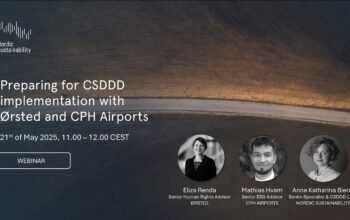
EFRAG has approved a draft on a voluntary sustainability reporting standard tailored to non-listed Small and Medium-sized Enterprises (SMEs). It will be launching for public consultation in the coming weeks, encouraging SMEs and other users to test the framework. In its current form, it provides SMEs a straightforward framework to actively participate in sustainability reporting, addressing key environmental and social challenges.
Understanding the voluntary ESRS for SMEs
SMEs make up 99% of all businesses in the EU, making them crucial in the transition towards a more sustainable future. The voluntary ESRS offers SMEs a simplified framework containing core elements needed for solid sustainability reporting, and by strengthening the management of environmental and social challenges, SMEs can improve their competitive edge, resilience, and financial accessibility.
Unlike its counterpart for larger entities, this ‘essentials edition’ of ESRS for SMEs covers the same sustainability issues but allows businesses to tailor their reporting to their preferred level of granularity based on business size. This flexibility is a game-changer for SMEs seeking to align with the new sustainability reporting standards. The standard applies to three different categories of small and medium-sized businesses defined as:
- Micro businesses not exceeding €350.000 in balance sheet total, €700.000 in net turnover and 10 employees
- Small businesses not exceeding two of the following thresholds: €4 million in balance sheet total, €8 million in net turnover, or an average of 50 employees
- Medium sized businesses not exceeding two of the following thresholds: €20 million in balance sheet total, €40 million in net turnover and 250 employees
National implementation of the legislation can also influence the scope. In the Danish bill implementing CSRD, the net turnover and balance sheet total thresholds defining small and medium-sized businesses are suggested to be increased by 25%, following the EU Commission’s decision to adjust criteria for micro, small, medium-sized and large companies in the Accounting Directive.
Exploring the three modules
The recently released draft of the voluntary ESRS represents a major leap forward in empowering smaller enterprises to embrace sustainability reporting. This comprehensive framework, designed with SMEs in mind, offers flexibility and choice through three distinct modules.
The Basic Module is targeted micro-sized companies, covering 11 reporting requirements which includes two general topics, five related to environmental topics, three on social topics, and 1 on governance. Businesses are required to report on a limited number of metrics, concentrating primarily on activities in own operations. As a result, the Basic Module allows businesses to report on information that they have more readily available without having to collect extensive data from their value chain/suppliers. Additionally, businesses are also encouraged to include sector specific information or metrics.
The Narrative-PAT module focuses on reporting related to Policies, Actions and Targets (PAT), and it is suggested to be relevant for undertakings that have formalised and implemented PAT. This module covers five reporting requirement, delving into strategy, business models, and key elements of the business’s sustainability-related initiatives. A double materiality assessment is part of the requirements, ensuring focus on the most relevant sustainability matters to the business. Once material matters are identified, the business must describe relevant adopted policies and their scope, actions taken to bring the policies to life, and targets set to ensure progress in the right direction.
The Business Partners Module is tailored to meet more intricate data requests from lenders, investors, and corporate clients. It addresses additional datapoints aligned with the Sustainable Finance Disclosures Regulation, enabling SMEs to provide comprehensive sustainability data that meet the evolving demands of the financial market. When applying this module, once again a materiality assessment guides the process, as businesses are required to report on the datapoints related to material sustainability matters.
Applying the Basic Module is a prerequisite for applying the Narrative-PAT and/or the Business Partners Modules, and once chosen, a module should be complied with in its entirety.
Double materiality assessments will remain a key element – also in SME sustainability reporting
At the core of Modules 2 and 3 lies a double materiality assessment, urging businesses to identify and report on sustainability matters that are important to their business activities. While not mandatory, stakeholder engagement to discern crucial sustainability matters is encouraged, emphasising a collaborative approach.
The role of SMEs in the future of sustainable reporting
In conclusion, the draft on voluntary ESRS for SMEs offers a comprehensive and flexible framework that aligns with the specific characteristics and scale of small and medium-sized enterprises. As SMEs navigate the sustainability reporting landscape, this new guidance will provide a structured approach to coherent, meaningful, and transparent reporting.
Nordic Sustainability encourages SMEs to view the voluntary ESRS as a tool for fostering positive change in the SME business landscape, and an opportunity to showcase genuine commitment to sustainable growth. As smaller businesses navigate the modules and make choices aligned with their identities, we stand ready to offer guidance, insights, and support. We help you redefine what sustainability reporting means for your company, turning it into a narrative of purpose, resilience, and genuine impact management.
For SMEs, corporates and investors wanting to participate in testing and shaping of the drafted framework, the deadline for signalling interest is 31st of January via email to VSME@efrag.org.



